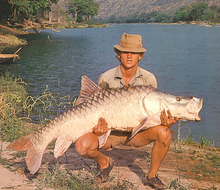Tor remadevii
| Orange-finned mahseer | |
|---|---|

| |
| Scientific classification | |
| Domain: | Eukaryota |
| Kingdom: | Animalia |
| Phylum: | Chordata |
| Class: | Actinopterygii |
| Order: | Cypriniformes |
| Family: | Cyprinidae |
| Genus: | Tor |
| Species: | T. remadevii |
| Binomial name | |
| Tor remadevii Kurup & Radhakrishnan, 2007 | |
Tor remadevii, the orange-finned mahseer, also known as the hump-backed mahseer, is a Critically Endangered species of freshwater fish endemic to the Western Ghats of India.[2] It is restricted to the Kaveri river basin.
It can be distinguished from other mahseer by the prominent hump originating above the pre-opercle, a distinctive kink in the pre-opercule, a terminal mouth position, and its bright orange caudal fin. It is considered a high-quality game fish, and has been proclaimed by anglers as "the largest and hardest fighting freshwater fish in the world".[3]
Conservation Issues
Among the reasons for the species' extreme threat status is the introduction of non-native mahseers Tor khudree [4] and Himalayan golden mahseer (Tor putitora) [5] to the wider Kaveri river basin. Also endangering this species is the heavy construction of dams along the Kaveri and tributaries, as well as the use of dynamite fishing.[6] These and other factors including loss of riparian cover, industrial and urban pollutions, irrigation and abstraction, plus climatic changes in monsoon weather patterns led to a heavy crash in hump-backed mahseer populations around 2004.
Despite this endangered status, the general lack of a formal scientific name had previously hampered efforts to protect the species. However, a 2018 study found that the orange-finned mahseer was in fact conspecific with Tor remadevii, a little-known species identified in 2007 based on 19 individuals [7] sampled from the Pambar River in 2004.[8] This has allowed the species as known from historic records across the whole river basin to finally gain a scientific name and an updated Red Listing. These will both be of help for future conservation efforts.
Gallery



References
- ^ Pinder, A.; Katwate, U.; Dahanukar, N.; Harrison, A. (2018). "Tor remadevii". IUCN Red List of Threatened Species. 2018: e.T56096394A56717605. doi:10.2305/IUCN.UK.2018-2.RLTS.T56096394A56717605.en. Retrieved 19 November 2021.
- ^ "Tor remadevii". IUCN Red List of Threatened Species. Retrieved 15 January 2019.
- ^ DOI: https://doi.org/10.3354/esr00673
- ^ https://eprints.bournemouth.ac.uk/34337/1/Pinder%20et%20al_JoTT_2020.pdf
- ^ "Tales from Velimeen Land". 20 August 2021.
- ^ "Can its scientific name save India's famed hump-backed mahseer?". Research Matters. 22 June 2018. Retrieved 30 June 2018.
- ^ Kurup, B Madhusoodana; Kurup, B. Madhusoodana; Radhakrishnan, K. V. (23 January 2024). "Tor Remadevii, A New Species of Tor (Gray) from Chinnar Wildlife Sanctuary, Pambar River, Kerala, Southern India". The Journal of the Bombay Natural History Society. 107 (3): 227––230.
- ^ Pinder, Adrian C.; Manimekalan, Arunachalam; Knight, J. D. Marcus; Krishnankutty, Prasannan; Britton, J. Robert; Philip, Siby; Dahanukar, Neelesh & Raghavan, Rajeev (20 June 2018). "Resolving the taxonomic enigma of the iconic game fish, the hump-backed mahseer from the Western Ghats biodiversity hotspot, India". PLOS ONE. 13 (6): e0199328. Bibcode:2018PLoSO..1399328P. doi:10.1371/journal.pone.0199328. ISSN 1932-6203. PMC 6010267. PMID 29924871.

